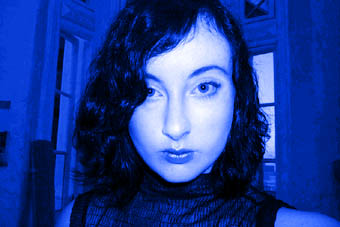Up and coming, ready or not
Andrew Beck talks to Rachel Dease

Rachel Dease
Take the stairs to the top of the old Salvation Army Citadel. At the third floor, 3 doors open onto a narrow landing. Opposite, a small twisting staircase spirals up into the darkness. Even at midday this passage requires an electric light. At the top is a small square room, your traditional artist’s garret. But the artist in this garret is not struggling to find her muse: Rachael Dease works here.
Dease’ latest work, The Scoundrel Becomes an Outcast, which she performs (piano and vocals) with the Schvendes Ensemble, premiered in the restored finery of the Old Midland Town Hall in October last year for the Artrage festival. The Scoundrel reflects her recent departure from predominantly chamber music oriented work. A “song cycle”, composed of 12 interwoven sections, it illustrates Dease’s recent explorations into jazz, blues and country and western. The slide guitar work of Schvendes Ensemble member Jonathan Brain lent a haunting tenor to the melancholy of the penultimate minutes. Dease says, “You throw something like a slide guitar in and you just can’t escape it. And it was played brilliantly; it certainly wasn’t played in traditional style…There is no way the other performers can escape how they are going to react when there is an explosion of lap steel.”
At 53 minutes this is more than twice the length of her longest piece pseudopop-for-fragile-insomniacs. The creation of The Scoundrel marks a maturing of Dease’ sense of authorship and compositional control. How did this occur? “It’s really hard as a director [of Schvendes Ensemble] and as a composer to work with a group of people and keep giving them what you want them to play when you know that they know their instruments a lot better than you do. Respecting them as musicians is a pretty big thing…I mean it was pretty controlled to a certain extent, what they actually did, but they did have a lot of freedom, more freedom than they would have in another group. I think their playing reflected that.”
Her use of controlled improvisation in The Scoundrel has resulted in “…playing that was a lot more emotive, organic…Quite a lot (of the Ensemble) are jazz musicians…they all received the same sheets so everyone knew what everyone else had…all of a sudden I was using, basically, jazz charts instead of classical scoring…and the Ensemble interpreted that in a completely different way and they played differently.”
When I remark that the second performance, at PICA, was noticeably different from the first, Dease smiles. “I wouldn’t have it any other way…I don’t know if I could get up at the moment and perform the same piece exactly the same way.”
Dease looks about the room, smiles, then laughs, “Maybe I lack discipline. I really like that element of rock music and jazz and blues. It would almost be a disappointment if performers from those genres got up and performed something exactly the same way that you heard them play it last time.” Surprise and spontaneity are part of Dease’ directorship of Schvendes Ensemble. Above the table where we are talking is Club Zho’s annual new music award (a Zhoey Award) to Dease and the Ensemble for “consistently rehearsing for major performances at the last moment.” This is not a lack of professionalism, it’s just logistics. In the case of The Scoundrel Dease says, “It was hard to get 7 musicians in the one place for a 3 hour rehearsal [late in the year].”
Before a full house in the theatrical space of the Old Midland Town Hall, in a glow of sidelight and bathed in the backwash from the video projection behind them, Dease and Schvendes Ensemble constructed The Scoundrel for the first time in its entirety.
“Because I work with Tristen Parr, the cellist…he knew the pieces. We worked together on them beforehand so [his] being in the string section was pretty concrete. He was able to lead. When we were performing I was directing Tristen and he was able to bring the string section in and out. And the string quartet reacted to his playing…Also Jonathan Brain, the guitarist and I had worked through some of the songs before. So it wasn’t completely blind, Definitely the whole show was unfolding before our eyes. It was the most enjoyable show I’ve ever done.”
Two weeks later The Scoundrel was performed at PICA which, she says was “…extremely enjoyable. I think in some ways the music was better. I think in both shows what was really amazing was the way the musicians fed off each other and what they were given. And they were able to explore genres like I had.
“The good thing about the Midland performance, about the Ensemble not really knowing the piece from go to whoa, was that they were really, really on the ball. There was no room for just sitting back and so they were thinking really hard about what they were going to do. The second time they were more relaxed and less worried, they knew how the piece was going to unfold and could therefore experiment a lot more but they were still very much on the ball.”
Dease is so pleased with the PICA performance that she has thrown out months of studio recordings in favour of that performance for the CD release of The Scoundrel.
Given the combination of her compositional talents, working methodology and the diversity and depth of ability of Schvendes Ensemble Dease says, “It’s hard not to get a unique sound.”
The Scoundrel Becomes an Outcast, Rachael Dease and Schvendes Ensemble, Artrage, old Midland Townhall, Perth, Oct 25
RealTime issue #53 Feb-March 2003 pg. 43






